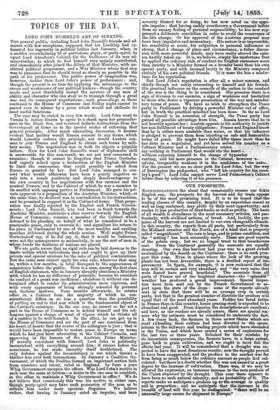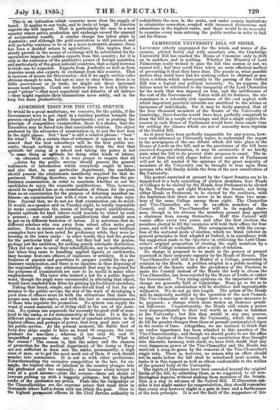OUR. PROSPECTS.
NOTWITHSTANDING the cloud that occasionally crosses our fickle English sun, the prospects for the harvest and for trade appear to be of the most promising kind. It is to be hoped that the trading classes of this country, taught by an experience recent as well as long sustained, may profit by their next opportunity, and render it less productive of drawbacks as well as profits. The basis of all wealth is abundance in the most necessary articles, and par. titularly, with civilized nations, of bread. And, luckily, the pro- mises of the harvest are not limited to our own changeable climate. In this country, the reports from all parts, but particularly from the Midland counties and the North, are of a kind that is properly called " magnificent." The corn is large, and in prime condition, and the " setting ' has been unusually early. There are good reports of the potato crop ; but we no longer trust to that treacherous root. From the Continent generally the accounts are equally cheering. Our own fine harvest last year was to a great extent neutralized by the dearth on the Continent : there is no such pros- pect this year. Even in places where the look of the growing plants has not been favourable, there is a decided report of ime provement. In Spain, for example, it is now reckoned that the crop will be certain and very abundant, and " the very rains -that were feared have proved beneficial." The accounts from all parts of France are of the brightest character—the "splendid" weather has produced a grand improvement. Special inspec- tors have been sent out by the French Government- to re- port upon the state of the crops : some of the reports already sent in state that there will be an average crop in certain parts, but that in the greatest number of districts the produce will equal that of the most abundant years. Fodder has fared better in France than in this country, hence grazing stock is expected to be abundant and good. From America the descriptions are excellent; and here, as our readers are already aware, there are special rea- sons why the estimate must be considered to underrate the fact. A few years back, the farmers in those newer States which are most extending their culture had been diverted to the specu- lations in the railways and trading projects which have abounded in the Union, and which have caused a series of explosions for the last two or three years. Rebuked for their mistake by its lamentable consequences, the farmers have, to a large extent, gone back to grain cultivation, and we ought to have felt the effects last year. It will be remembered that a drought was ex- pected to have the most disastrous results; now the drought proved to have been exaggerated, and the produce in the market was far from being so much below the ordinary amount as people had cal- culated: but there is a doubt whether this was not caused in a great degree by the increase of cultivation. There was, if we may be allowed the expression, an immense increase to the corn produce of the Union disguised by the drought. This year there appears to have been no such natural calamity, and no probability of it. The reports make us anticipate a produce up to the average in quality and in proportion ; and we anticipate that the increase to the breadth of land will this year be undisguised : " there will be an unusually large excess for shipment to Europe." This is an indication which concerns more than the supply of bread. It applies to our trade, and to trade at large. If America exports she will import. That is particularly the case in a new country where active production and exchange exceed the anleunt of accumulated wealth. A similar change has taken place in Australia; and although the gold-excavation is still pursued, and will probably continue to be so in a more systematic manner, there has been a decided return to agriculture. This implies that a steady growth in the means of exchange will be substituted for the speculative impulse to sudden exports from this country; for it is only in the extension of the productive power of foreign countries, and particularly of the great colonial countries, that a rapid increase to trade can be expected. Exports from Australia as well as from America mean also exports in exchange from this country. That is increase of means for this country; and if we apply certain rules obvious enough to note, but not so easy to obey where there is so little government as in trade, we might use these increased means most largely. Could our traders learn to look a little be- yond "prices "—that most superficial and delusive of all indexes —they might regulate their transactions more safely, and in the long run more productively.



























 Previous page
Previous page